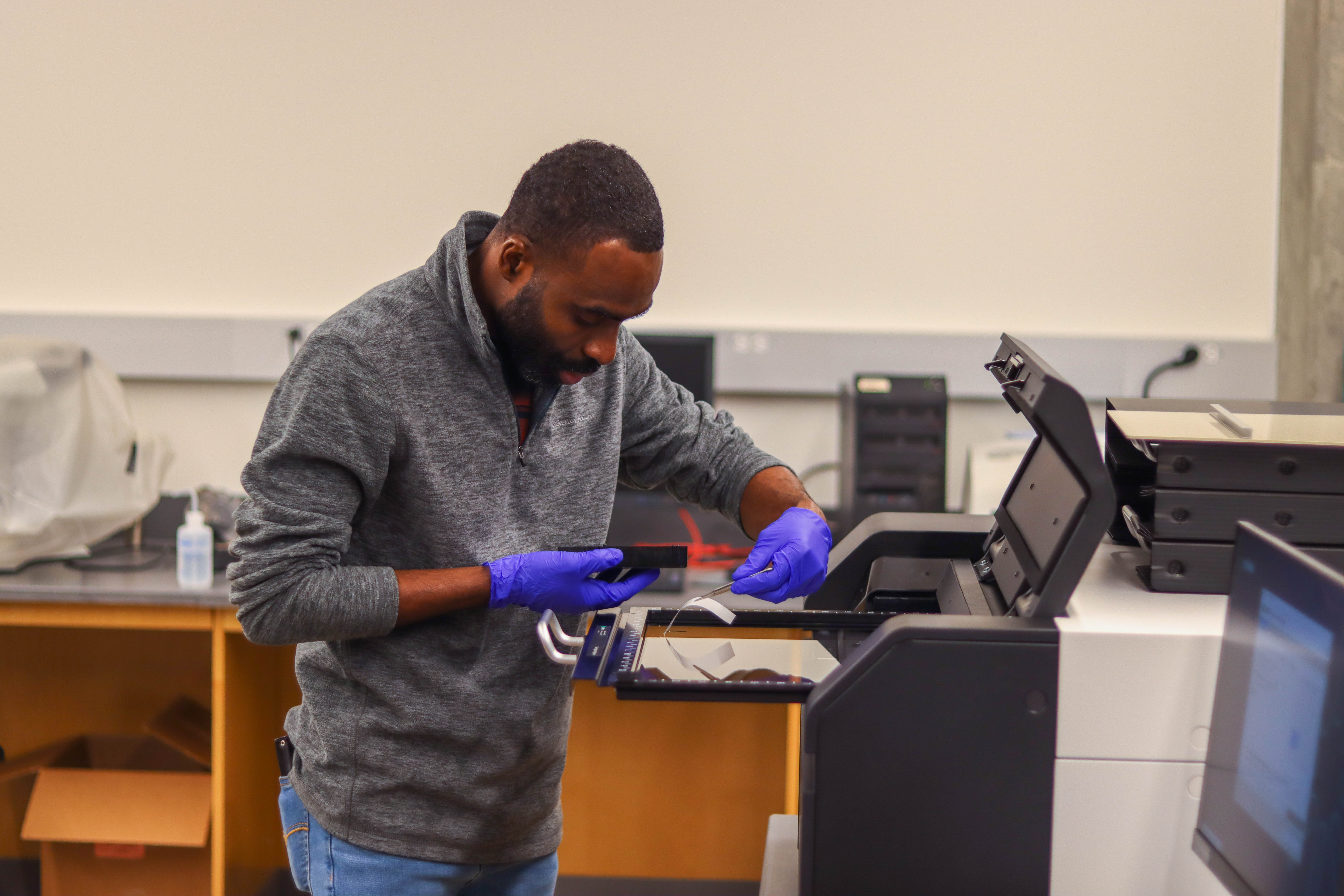
Did you know that a degree in chemistry can set you on the path to becoming a doctor? If you combine Ball State’s biochemistry degree with our pre-med program, you’ll have an advantage in medical school preparation.
Even if your future plans don’t include the medical field, our biochemistry degree is excellent preparation for careers in biochemistry-related fields, or in industrial or government laboratories.
In this program, you will master a core set of competencies in chemistry, biochemistry, and biology.
What is Biochemistry?
Biochemistry explores chemical structures and chemical reactions among living organisms. Professionals work in laboratories to study parts of the cell—proteins, lipids, and organelles—and how they chemically interact with each other. The field ranges wide in disciplines and covers medicine, genetics, microbiology, forensics, and more. Learn more about this field.
What It’s Like to Study Biochemistry at Ball State
Our knowledgeable faculty and staff are committed to serving our students. We take great pride in our faculty-student interactions, incorporating faculty supervision in all laboratories, encouraging cooperative learning, and providing numerous opportunities for both formal and informal student-faculty engagement.
Read Their Bios
The Chemistry Research Immersion Summer Program (CRISP) is one of the largest undergraduate research programs in chemistry in the nation. An average of about 40 students each summer have participated in CRISP over the past several years.
CRISP students do research, attend research group meetings, and have the opportunity to present their findings at weekly research meetings. All of the students in the program also present a poster describing their research at the CRISP poster session at the end of the summer session.
Learn More
We have a variety of state-of-the-art scientific equipment which our students are encouraged to use. Many of our instruments are the same kind you would find on the popular show CSI.
You will not watch idly as your professors use all this sophisticated equipment—you will work with the equipment yourself.
In addition, our department uses the University Imaging Laboratory, which includes electron microscopy facilities.
Departmental instrumentation includes:
- 400 and 300 MHz multinuclear NMR spectrometers
- FT-IR Spectrometers
- Gas Chromatographs
- High-Performance Liquid Chromatographs
- Fluorescence spectrometers
- Flame AA/AE and graphite furnace AA
- Differential Scanning Calorimeter
- Laser Flash Photolysis
- GC/MS
- Ultimate 3000 Rapid Separation LC unit coupled to an LTQ XL linear ion trap mass spectrometer
Student Affiliates of the American Chemical Society (SAACS) is open to all students. This vibrant, award-winning group meets monthly to do service for the community and Ball State. SAACS members promote an interest in chemistry, address issues facing chemistry students, and promote an awareness of the responsibilities and challenges of today's chemists.
Learn More
Our small class sizes give students the opportunity to get the focused, one-on-one attention from instructors they need to succeed academically. Students also work closely together in our organizations, research labs, and in the community to promote chemistry education.
Major Requirements
This program consists of courses in chemistry, biochemistry, and biology, and leads to a bachelor of arts or bachelor of science (BA/BS) in chemistry/biochemistry.
You will also need to meet course requirements set by our University Core Curriculum.
Credits
Total: 120
- University Core Curriculum: 36
- Major-Specific Courses: 35-37
Courses
A few of the classes you will take include:
- General Chemistry
- Organic Chemistry
- Physical Chemistry
- Principles of Biochemistry
- Biochemistry Laboratory Techniques
You will also need to take classes in physics and calculus.
For a complete list of all the courses you will take and their descriptions, please see our Course Catalog.
View Catalog
Cutting-Edge Technology

The Chemistry Department received a National Science Foundation Major Research Instrumentation award to purchase a state-of-the-art laser-based scanning platform Typhoon-5TM.
The Typhoon-5TM is a super high resolution and sensitivity molecular imager that is commonly used in high-quality labs to do a wide variety of biological, biochemical, and chemical analyses. The Typhoon-5TM is expected to make research and training impact to at least seven faculty members from chemistry and biology departments and more than 100 undergraduates each year for chemistry, microbiology, cell biology, and organic chemistry labs. Faculty and students will utilize the Typhoon-5TM to examine protein quantification, RNA molecules, drug molecules, and radioactive molecules, and many more.
Associate professor of chemistry, Dr. Emil Khisamutdinov said, “the new biomolecular imaging platform is a “must-to-have” equipment in any modern biochemical facility, as it allows not only to perform quantitative and qualitative analysis of various types of biomolecules but also serves as an imperative tool to develop light-emitting biomarkers and RNA-based diagnostic probes.”
What Can You Do with a Degree in Biochemistry
This major prepares you for employment in industrial or governmental laboratories or for further study in graduate or professional programs. This major, combined with a premedical major, provides excellent preparation for medical school.
Graduates of our program have also found chemistry-related employment with companies like:
- Eli Lilly and Company
- Corteva Agriscience
- Roche Diagnostics
- Procter & Gamble
- Pfizer
- Element Materials Technology
Paying for Your Education
On top of the dozens of funding options offered through Ball State’s Office of Financial Aid and Scholarships, our department awards scholarships to our own students. Find a scholarship.
Ready to Apply?
Admission to Ball State is selective, and we carefully evaluate all application on an individual basis. Applying for admission is easy. Use our convenient, comprehensive, and secure online application.
Want to Learn More?
The best way to get a true feel for Ball State is to spend some time here, so we encourage you and your family to schedule a campus visit. Take a tour, attend an information session, meet with a professor in our area, and ask plenty of questions. Or, if you’d rather speak to someone directly by phone or email, please feel free to contact us.